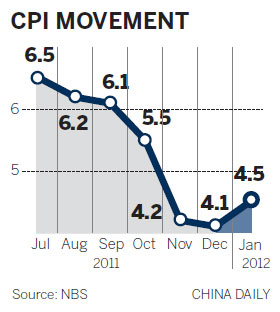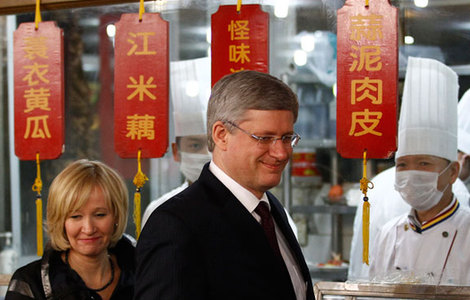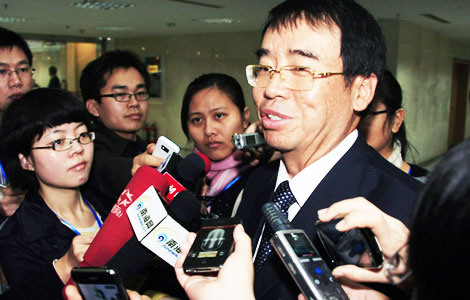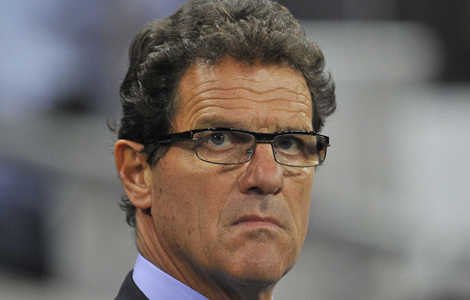CPI rise may deter monetary policy loosening
Updated: 2012-02-10 07:51
By Chen Jia and Wang Ying (China Daily)
|
|||||||||||
Rate hits 4.5% after food prices soar during Spring Festival

BEIJING / SHANGHAI - The inflation rate hit an unexpected three-month high in January as consumers increased spending during the Chinese New Year holiday.
The rate may deter policymakers from further loosening monetary policy, analysts said.
The consumer price index (CPI), a main gauge of inflation, rose 4.5 percent in January from a year earlier, higher than the 4.2 percent forecast among economists. This brought an abrupt halt to a run of five months of easing price pressures, according to data released by the National Bureau of Statistics (NBS) on Thursday.
If the holiday factor is discounted, inflation may still be declining, said Daniel Farley, a senior managing director of State Street Global Advisors, a US-based asset management company.
"The central bank may still have room to further loosen monetary policy, but at a moderate pace," Farley said.
Zhang Zhiwei, chief economist with Nomura Securities, said that the inflation rate provides evidence of risks and consequently "constrains the ability of the central bank to loosen monetary policy".
Food prices that account for about one-third of the CPI basket gained 10.5 percent year-on-year in January, compared with a 9.1 percent increase in December. Surging food prices have driven the CPI up by 3.29 percentage points.
China's one-week Lunar New Year holiday ran from Jan 22. According to an NBS survey on food prices in 50 cities, from Jan 21 to 30, the average price growth of nine popular vegetables increased by about 10 percent.
"I spent more than 10,000 yuan ($1,587) during the holiday," said Fan Ye, who works with a Shanghai-based US company. Preparing for family dinners and buying gifts for relatives accounted for most of Fan's expenditure.
Some people are taking measures to combat the inflation risk.
"I do not see any sign that consumer prices will go down in the near future. I prefer to buy art and gold to retain value," Li Feifei, an employee at a State-owned company in Shanghai, said.
Non-food prices gained 1.8 percent last month from a year earlier, compared with 1.9 percent in December.
The producer price index, which measures the cost of goods at the farm and factory gate, rose 0.7 percent in January compared with 1.7 percent in December, the NBS said, indicating consumer price pressures would ease in the coming months.
Inflation was a headache for the government last year. The authorities took measures, including tightening bank lending and capping prices, to curb it but it still hit a 37-month high of 6.5 percent in July before declining to a 15-month low of 4.1 percent in December.
The festering European debt crisis is squeezing out China's exports.
The International Monetary Fund (IMF) this week warned that an escalation of Europe's fiscal woes could slash China's economic growth by half this year, and it urged Beijing to prepare stimulus measures in response.
In the IMF's "downside scenario" China's growth would fall by around 4 percentage points this year from the 8.2 percent rate it projected in January.
The nation's GDP slowed in the last quarter of 2011 to 8.9 percent from 9.1 percent in the third quarter and 9.5 percent during the April-to-June period.
Wang Tao, chief economist with UBS AG in China, said that the macroeconomic stance should support economic growth, instead of being changed on inflation fears.
"We continue to expect a generally stable macro stance in 2012, with modest easing in credit and more fiscal support in livelihood areas," Wang said.
Zhang, with Nomura Securities, predicted that there might be another 50 basis point cut in the required reserve ratios for banks next month. The central bank cut the cash that banks should keep aside in December.
"The January CPI may be the year's peak," said Zhu Haibin, chief economist of JP Morgan in China.
In February the CPI may still be higher than 4 percent, but is likely to ease from April and may drop to the lowest point of 2.8 percent in the second half, Zhu said.
Hot Topics
Kim Jong-il, Mengniu, train crash probe, Vaclav Havel, New Year, coast guard death, Internet security, Mekong River, Strait of Hormuz, economic work conference
Editor's Picks

|

|

|

|

|

|







